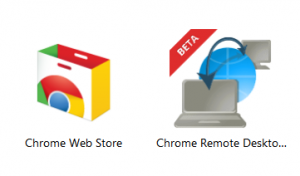The following is a contribution from David Greene of Greene and Greene, Attorneys at Law in Dover, NH.
 For years, I used GoToMyPC for my remote desktop needs. Or sometimes I would use Windows 7 Professional to remotely control the desktop of another Windows 7 computer. These programs were okay, but were clunky and took many keystrokes and mouse clicks to get started. They were great for data transfer, but not so great on content delivery.
For years, I used GoToMyPC for my remote desktop needs. Or sometimes I would use Windows 7 Professional to remotely control the desktop of another Windows 7 computer. These programs were okay, but were clunky and took many keystrokes and mouse clicks to get started. They were great for data transfer, but not so great on content delivery.
Recently though, Google has implemented its Google Chrome Remote Desktop application. It’s fast – it connects in the amount of time that you can type in a PIN. It is fast enough to stream video with little loss. If one is able to stream a program like Netflix to a remote computer, questions regarding copyright are raised.
A remote desktop is a term used to describe a connection whereby a user controls a master computer to indirectly (or remotely) control a slave computer.
For example, if I am feeling cheap, I can remotely connect to the computer of a person willing to pay for Netflix. My connection to this person’s computer depends on my first obtaining permission, but, without license to use Netflix, I can still watch it. And yes, the person that I connect to will have to watch the same show as me, so functionality is not as good as if there were two Netflix licenses, but if I have enough friends that allow me to remotely connect to their computers, then the limitations begin to disappear.
The copyright implications seem readily apparent. Companies like Netflix are upset about this (or should be), because they arguably lose profit. I think that we may see some changes to Google Remote Desktop in such a way as it begins to respond to digital rights management technology. Content flags in Netflix and related programs which prevent the broadcast of content from a slave to a master computer, while at the same time allowing file transfers and other remote uses that are less likely to be construed as infringing, are likely consequences of the ubiquity of the remote desktop.
If we reduce to the absurd, we can think about a master computer telling its slave to download copyrighted material. We could think of a master computer controlling a slave in a jurisdiction where non-private copying is expressly allowed. Or, we could think about a secondary market for Netflix-like applications. (To change the earlier scenario where I am cheap) If I know that I never watch Netlfix between 10 pm and 10 am, then I could sell that time to someone by granting them access to my desktop for that period of time.
Let’s forget for now that its a bad idea right now to allow someone unfettered access to one’s desktop – the point is that the technology is now available without financial outlay and this technology allows for such outsourcing of my computer’s resources. Where such outsourcing is possible, the question of who will be liable comes to mind.

